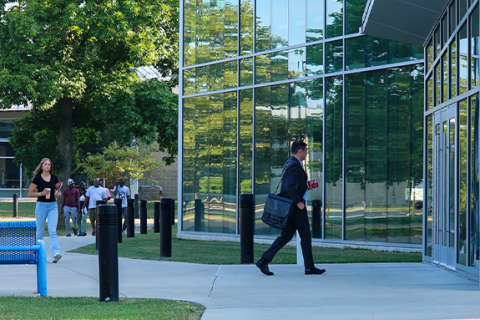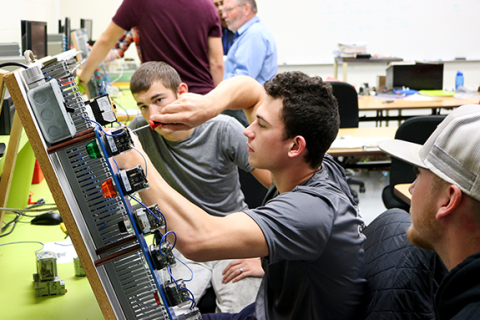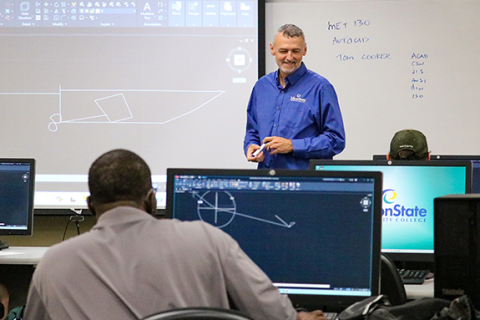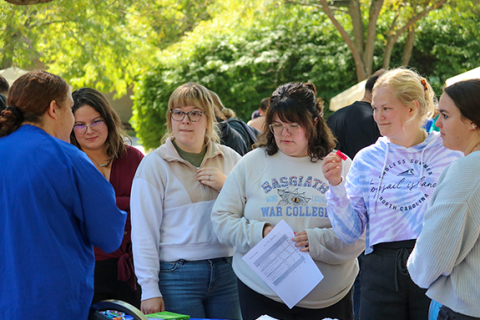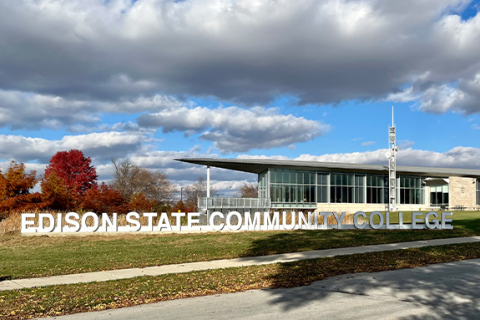Accessibility &Disability Support Services
Services in support of learning.
Eliminating barriers.
Explore Accessibility & Disability Support Services at Edison State to find out if you are eligible for services, how to apply, and what services are available. Additional resources are available to you as a student, parent, teacher, or counselor.
mission
The mission of the Accessibility and Disability Support Services Department at Edison State Community College is to enhance each student's individual educational experience by preventing discrimination on the basis of disability. The right to reasonable accommodations allowing equal access to Edison State Community College programs and services for individuals with disabilities who request them is ensured under Section 504 of the Rehabilitation Act of 1973 and the Americans with Disabilities Act (ADA).
How to get started.
To get started, first obtain an Accessibility and Disability Support Services Application packet. You may pick up a copy of the application packet at the Piqua Campus, Room 160 or download and print the forms below. Students are encouraged to register with Accessibility and Disability Support Services two to four months prior to their enrollment at Edison State Community College. Students are encouraged to contact Admissions to apply for admission to the college prior to applying for services.
STEP ONE Submit all of the following documentation.
Complete the following two forms.
Complete the following forms regarding your disability or disabilities.
- Certification of Physical Disability Form
- Certification of Psychological Disability Form
- Certification of ADHD Form
In addition, please provide a list of the services you received in high school and/or other schools attended.
Individual Education Plan (IEP) from high school, 504 Plan, or Letter of Services from previous colleges attended.
STEP TWO Schedule a pre-service interview.
Once all documentation has been submitted, contact Student Services at 937.778.7850 to schedule a pre-service interview with Accessibility and Disability Support Services. The pre-service interview is designed to assess:
- the services that a student is eligible to receive based on the documentation submitted,
- disability-related needs,
- preparations for attending college.
You and your parents or other advocates are invited to attend the pre-service interview, which should be scheduled prior to entering Edison State.
Additional Information
All submitted documents are placed in a confidential student file and will not be returned to the applicant or forwarded to any agency, college, or university. We suggest you submit copies and retain the original documents for your records.
It is important to remember that applying with Accessibility and Disability Support Services is a separate application process. You will still need to go through the application process necessary to be admitted to the college and/or any selective admission programs.
Please submit all completed forms to
Accessibility and Disability Support Services
1973 Edison Drive
Piqua, OH 45356, or
FAX 833.594.1391
All services and accommodations are tailored to meet the individual's needs and are based upon the documentation that the student provides to Accessibility and Disability Support Services.
Available Services
- Testing accommodations are determined by Accessibility and Disability Support Services but scheduled and proctored in collaboration with the Library and Testing Services.
- Note-Taking Assistance
- Materials in Alternative Formats
- Textbooks in Audio Format—Register with Bookshare to see if the textbooks you need are available.
- Electronic format
- Large print
- Recorded lectures
- Interpreters
- Adaptive technology
- Temporary accessible parking
Accessibility and Disability Support Services view all materials pertaining to a student's disability as confidential. All student disability-related information is housed in the Accessibility and Disability Support Services Office. Only Accessibility and Disability Support Services staff members have access to these files.
Only information pertaining to disability will be released when and if a student submits a signed Release of Information form.
The Family Educational Rights and Privacy Act (FERPA), also known as the Buckley Amendment and the Americans with Disabilities Act (ADA), do not allow faculty or other individuals access to disability-related information.
According to AHEAD, "it is only necessary to share with the faculty the information that a student has a documented disability and need for accommodation(s)." Faculty members have no need to know the nature of the disability, only that it has been appropriately verified by the individual (office) assigned this responsibility on behalf of the institution."
Accessibility and Disability Support Services will retain all documentation for five years after a student leaves the College.
Resources
Bookshare®
The goal of Bookshare® is to make the world of print accessible to people with disabilities. With a dynamic leadership team, dedicated members and capable partners, Bookshare is making this goal a reality. Accessibility and Disability Support Services has a membership with Bookshare.
Kurzweil Assistive Learning Technology
Kurzweil is an assistive learning technology.
U.S. Department of Education
The U.S. Department of Education includes information and resources, especially for individuals with disabilities and their families.
- Students with Disabilities Preparing for Postsecondary Education: Know Your Rights and Responsibilities
- The Civil Rights of Students with Hidden Disabilities Under Section 504 of the Rehabilitation Act of 1973
- Transition of Students With Disabilities To Postsecondary Education: A Guide for High School Educators
Affordable Colleges Online
Affordable Colleges Online provides study tips for college students with dyslexia and dysgraphia, including assistive technology, test-taking strategies, and other resources.
Opportunities for Ohioans with Disabilities
Opportunities for Ohioans with Disabilities is the State of Ohio agency that partners with Ohioans with disabilities to achieve quality employment and independence, as well as making determinations on Social Security disability through the Bureau of Vocational Rehabilitation, Bureau of Services for the Visually Impaired and the Division of Disability Determination.
Golden Buckeye Program
All Ohioans aged 60 and older, as well as adults aged 18-59 who have disabilities as defined by Social Security, are eligible to participate in the Golden Buckeye Program and qualify for a free Golden Buckeye Card. Those with the Golden Buckeye Card can save at retailers across the state.
ADHD Support
Many adults go for years unaware that they have ADHD. They assume, as many people do, that ADHD is a "kid's" disorder. There are many resources available to help adults with ADHD. Find out more about the signs, symptoms and latest studies in attention research.
Psychological & Learning Assessments
Learning Solutions
Learning Solutions provides evaluation, diagnosis, and documentation of educationally-related learning problems such as specific learning disabilities and Attention-Deficit/Hyperactivity Disorder in adolescent and adult learners. Learning Solutions services are available on a sliding fee scale, and they may be able to travel to Edison State to provide students with on-campus testing. For more information, visit the Learning Solutions website or call 937.417.7529.
The Assessment Clinic
The Assessment Clinic is affiliated with the School of Professional Psychology at Wright State University. It is located at the Duke E. Ellis Human Development Institute on the corner of West Third Street and Edwin C. Moses Boulevard. The Assessment Clinic was developed to provide psychoeducational and psychological assessments for clients affected by problems in learning, mental health, and drug and alcohol abuse. Services are provided to children, adolescents, and adults. Written reports are prepared for clients and referral sources whenever possible. A sliding fee scale is used to determine the cost of services. Costs do not usually interfere with providing services. For more information, please visit The Assessment Clinic website or call 937.775.4300.
Your Role as a Faculty Member
Mandates
The Americans with Disabilities Act and Section 504 of the Rehabilitation Act of 1973 ensure that students with disabilities are provided equal access to education and all of the opportunities and services that the institution provides.
Process
Students must identify the presence of a disability and request accommodations through Accessibility and Disability Support Services to receive accommodations. Students are asked to complete the application for Accessibility and Disability Support Services, Release of Information, and provide documentation of the disability for which they are applying for accommodations. The student will receive an Approved Accommodation, a Self-Identification letter listing accommodations that they may use, and recommendations based on the documentation they provided to Accessibility and Disability Support Services.
Students must request a new Accommodation Self-Identification letter each semester to give to each instructor. The Self-Identification letter is prepared by Accessibility and Disability Support Services and lists the accommodations that are appropriate for the student.
When a student presents you with a Self-Identification letter, meet privately with the student and review the accommodations as they relate to your class. You may inquire as to how the student's disability may affect specific tasks required in your class, but never ask the student what is "wrong" with them or for details about their disability.
A student will need to request some accommodations and services directly from Accessibility and Disability Support Services (e.g., reader for tests), but they may need to request other accommodations directly from you (e.g., test be sent to the library, extra time, instructor provided notes).
Notice
The Accessibility and Disability Support Services Statement in your syllabus serves as a reminder to students to discuss the accommodations they need with you or to apply for services if they have not yet done so. The recommended statement is below.
Edison State Community College will make reasonable accommodations for students with documented disabilities. If you believe you may need an accommodation based on the impact of a disability, contact the instructor privately with your self-identification letter. If you do not have a self-identification letter, contact Accessibility and Disability Support Services by email or call 937.778.8600. Accessibility and Disability Support Services is located on the Piqua Campus in Room 160.
If you have questions about an accommodation or how to best serve a student, contact Accessibility and Disability Support Services.
Requested accommodations are not retroactive; that is, you are not required to re-administer tests or make adjustments to course activities that have already occurred if the student makes a request late in the term. However, from the date you receive the Self-Identification letter moving forward, you must make the necessary adjustments.
Confidentiality
Information about a student's disability is classified as health information and is confidential. Accessibility and Disability Support Services cannot share information about a student's disability unless the student has granted permission to share this information or there is a demonstrated institutional need to know. With the student's permission, designated faculty and/or staff will be advised only of the information that they need to know to accommodate the student or to protect the safety and health of the student or others. Consider any communication regarding a student's disability or special needs to be confidential. Destroy any written communication you receive at the end of each term.
Reasonable Accommodations
Reasonable accommodation of a disability is typically an adjustment to the learning environment that eliminates or reduces physical or instructional barriers to learning encountered by a student. The adjustment must be based on the individual student's documented need and tailored to the specific student's disability. Both the student's physical accessibility to the classroom as well as the ability to fully participate in all course activities are considered in the process of providing reasonable accommodations.
An accommodation is unreasonable:
- when it creates a change in requirements that are essential to the program of instruction;
- fundamentally alters the nature of the program;
- imposes an undue financial or administrative burden;
- or poses an appreciable threat to personal or public safety.
If you feel a request is unreasonable, discuss your concerns with Accessibility and Disability Support Services. If there is a difference of opinion, the College will consult with appropriate department administrators and make a determination regarding the appropriateness of the accommodation.
Faculty Responsibilities in Providing Accommodations
Testing
Students may need test accommodations such as extra time, a distraction-reduced environment, a test reader and/or scribe, or access to adaptive software. You may work with your student to set up these arrangements, or you may choose to use the Library Testing Services to provide accommodations.
When a student needs a reader or scribe for exams, you will need to assist the student in completing the Testing Request Form. If the date of an exam changes, notify the Edison State Library at 937.778.7950 as soon as possible to ensure that a proctor will be present to assist the student.
Tests are scheduled as close as possible to the date and time that the test is given in the classroom. However, it may be necessary to begin a test earlier, later, or on a different day in order to accommodate a student's classes and/or work schedule.
For tests administered in the Library, please send a completed Testing Request Form and the student's copy of the exam to the Library no later than the day before the exam. You may deliver the completed Testing Request Form and a copy of the exam in person or via email.
Note-Taking Assistance
There are different ways to accommodate a student who requires note-taking assistance. Factors that need to be considered to determine the best option are the student's abilities, the nature of the course, and your teaching methods. The following are the most typical options.
- Faculty-Provided Notes
These include the PowerPoint presentation outline of your lecture. Posting your PowerPoint slides in Blackboard before class allows the student to review them before class and use them during class to augment their own notes. This is a universal design that benefits all students. - Student Volunteer
If you do not use PowerPoint for your lectures or the student is unable to take notes independently, this may be the best option. Ask your students if they would like you to request a volunteer note-taker. To recruit a classmate as a volunteer note-taker, Disability Services offers a free NCR notepaper and the use of a photocopy machine. Never identify your student to the class in any way. You may wish to make a statement such as;
"We have a student in our class who needs assistance with note-taking. Please see me after class to volunteer. You will be provided with note-taking paper. Your assistance will be greatly appreciated."
You may consider offering incentives to students who volunteer (such as extra credit points). If you and your student have difficulty setting up a note-taking system, contact Disability Services.
Recording Lectures
Reviewing material presented orally in class may be a vital study aid for some students, and they must be permitted to record class lectures. You may ask that a student sign a statement promising that recordings will be utilized for personal use only and will not be shared. Please note that the use of LiveScribe pens follows the same guidelines as the use of tape or digital recorders.
Sign Language Interpreters and Real-Time Captioning
Sign language interpreters and real-time captioning (transcribers) provide communication access services for students who are deaf or hard of hearing. A student requiring these services will enter their request via Accessibility and Disability Support Services. You may request a consultation with Accessibility and Disability Support Services to better understand the role of an interpreter or transcriber in your class. Please note it is good practice to repeat questions and comments that are made in the classroom so the interpreter or transcriber can hear and include that information.
Alternate Media Formats
Students may contact you about printed materials that need to be adapted into an alternative format (such as audio or electronic). They may request copies of your handouts and overheads or text information so that printed materials can be ready at the start of the term. They may ask to borrow an extra copy of the text while their texts are used for production.
Media Captioning
All videotapes and DVDs used in class must be captioned or subtitled. Students needing this accommodation may contact you early in the term about their media plans for the course. If your material is not already captioned, Accessibility and Disability Support Services requires a minimum of three weeks to produce a captioned copy.
In accordance with the requirements of Title II of the Americans with Disabilities Act of 1990 (ADA), Edison State Community College will not discriminate against qualified individuals with disabilities on the basis of disability in its services, programs or activities.
Employment
Edison State Community College does not discriminate on the basis of disability in its hiring or employment practices and complies with all regulations promulgated by the U.S. Equal Employment Opportunity Commission under Title I of the Americans with Disabilities Act.
Effective Communication
Edison State Community College will generally, upon request, provide appropriate aids and services leading to effective communication for qualified persons with disabilities so that they can participate equally in Edison State programs, services, and activities, including qualified sign language interpreters, documents in Braille and other ways of making information and communication accessible to people who have speech, hearing or vision impairments.
Modifications to Policies and Procedures
Edison State Community College will make all reasonable modifications to policies and programs to ensure that people with disabilities have an equal opportunity to enjoy all of its programs, services, and activities. For example, service animals are welcome at Edison State Community College, even though pets are generally prohibited.
Anyone who requires an auxiliary aid or service for effective communication or a modification of policies or procedures to participate in a program, service, or activity of Edison State Community College should contact Marissa Hill in Accessibility and Disability Support Services by email or by calling 937.778.8600 as soon as possible, but no later than 48 hours before the scheduled event.
The Americans with Disabilities Act does not require Edison State Community College to take any action that would fundamentally alter the nature of its programs or services or impose an undue financial or administrative burden.
Complaints regarding a program, service, or activity of Edison State Community College being inaccessible to persons with disabilities should be directed to Marissa Hill in Accessibility and Disability Support Services by email or by calling 937.778.8600.
Edison State Community College will not place a surcharge on a particular individual with a disability or any group of individuals with disabilities to cover the cost of providing auxiliary aids/services or reasonable modifications of policy, such as retrieving items from locations that are open to the public but are not accessible to persons who use wheelchairs.
This Grievance Procedure is established to meet the requirements of the Americans with Disabilities Act of 1990 (ADA). It may be used by anyone who wishes to file a complaint alleging discrimination on the basis of disability in the provision of services, activities, programs, or benefits by Edison State Community College. The College's Personnel Policy governs employment-related complaints of disability discrimination.
The complaint should be in writing and contain information about the alleged discrimination, such as name, address, phone number of complainant and location, date, and description of the problem. Alternative means of filing complaints, such as personal interviews or tape recordings of the complaint, will be made available for persons with disabilities upon request.
The complaint should be submitted by the grievant and/or his/her designee as soon as possible but no later than 60 calendar days after the alleged violation to
Marissa Hill
Accessibility and Disability Support Services
1973 Edison Drive
Piqua, Ohio 45356
Within 15 calendar days after receipt of the complaint, Accessibility and Disability Support Services, or their designee, will meet with the complainant to discuss the complaint and possible resolutions. Within 15 calendar days of the meeting, Accessibility and Disability Support Services, or their designee, will respond in writing and, where appropriate, in a format accessible to the complainant, such as large print, Braille, or audio tape. The response will explain the position of the College and offer options for substantive resolution of the complaint.
If the response by Accessibility and Disability Support Services, or their designee, does not satisfactorily resolve the issue, the complainant and/or his/her designee may appeal the decision within 15 calendar days after receipt of the response to the Dean of Student Engagement or his/her designee.
Within 15 calendar days after receipt of the appeal, the Dean of Student Engagement, or his/her designee, will meet with the complainant to discuss the complaint and possible resolutions. Within 15 calendar days after the meeting, the Dean of Student Engagement, or his/her designee, will respond in writing and, where appropriate, in a format accessible to the complainant with a final resolution of the complaint.
All written complaints received by Accessibility and Disability Support Services or their designee appeals to the Dean of Student Engagement or his/her designee, and responses from these two offices will be retained by the College for at least three years.
Students needing long- or short-term disability plates or placards for their vehicle(s) should contact the Bureau of Motor Vehicles in their area. Detailed information can be found on the Bureau of Motor Vehicle website.



